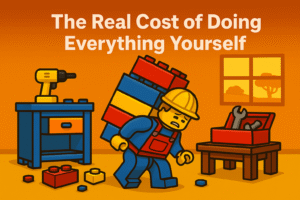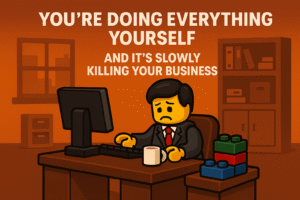What Happens If You Don’t Show Up Tomorrow?
Be honest…
If you disappeared for a week with no laptop, no calls, no “quick WhatsApp voice notes”, would your business:
- Keep running?
- Stall completely?
- Implode in 3 days or less?
If you’re the centre of every decision, delivery, and invoice…
You don’t own a business.
You own a job with overhead.
And that’s not scalable. That’s stressable.
You’re Still the System
Let me guess…
- You’ve hired people, but they “still need you”
- You have offers, but they’re not clearly documented
- You take holidays… and end up working from your phone
- You thought growth would feel lighter, but somehow it feels heavier
You’re not doing it wrong. You’re just missing structure.
A business that depends on you is a fragile business.
But a business built on systems, well that’s freedom.
The Myth of Founder Superpowers
Being good at everything isn’t a strength, rather it’s a liability.
You’re used to:
- Solving problems fast
- Pivoting when needed
- Delivering a great result yourself
But that ability has become a crutch.
Your business leans on you instead of standing on systems.
My First Test of Real Systems
Years ago, I built a side business around clothing.
It took off fast. But every sale, every enquiry, every piece of marketing… ran through me.
Then I got sick.
Out of action for a week.
We lost leads. Missed orders. Almost lost the business.
That was my wake-up call:
Build a business that doesn’t need you in order to breathe.
The LEGO Analogy: Build the Foundation Once
If you rebuild your LEGO set every time you move it, it’s not a stable structure.
But if it’s locked in with instructions, anyone can finish the build.
Even when you step away.
Your business should be like that.
The Business Autonomy Blueprint
Here’s how I build this for clients:
| Step | Action |
|---|---|
| 1. Document Everything | Create a “How We Work” guide. Use Loom, Notion, or Google Docs. Doesn’t need to be fancy, just repeatable. |
| 2. Hire Roles, Not Helpers | Don’t just get assistants. Hire owners of outcomes. |
| 3. Automate Repetition | Templates, workflows, email sequences. If you’ve done it 3 times, it should be a system. |
| 4. Build a Default Diary | Your team needs rhythm. Define the weekly cadence, meetings, reviews, and outputs. |
| 5. Step Out, Bit by Bit | Test it. Go offline every Friday. Then a weekend. Then a full week. Improve where it breaks. |
The Real Goal
You’re not building a business that just works.
You’re building one that works without you.
That’s what creates time. Options. Legacy.
This is my favourite type of work.
Getting into the guts of your business and redesigning it to run whether you’re at your desk or on a game drive in the bush.
If you left your business for 7 days… would it survive or stall?
Let’s build your legacy Together
Book a free call to chat about where you need help


